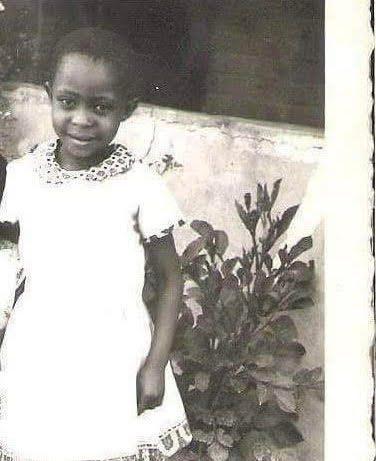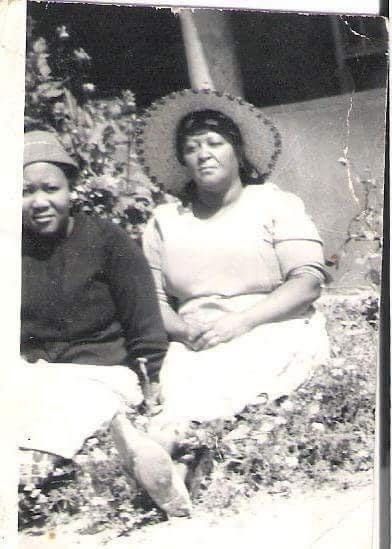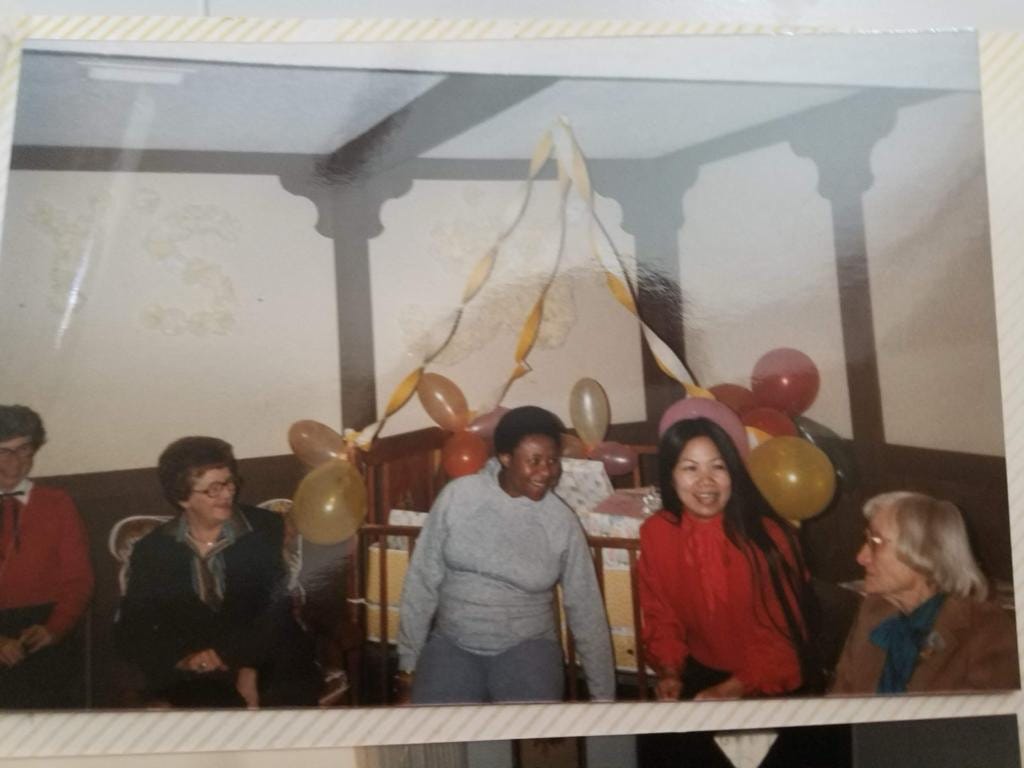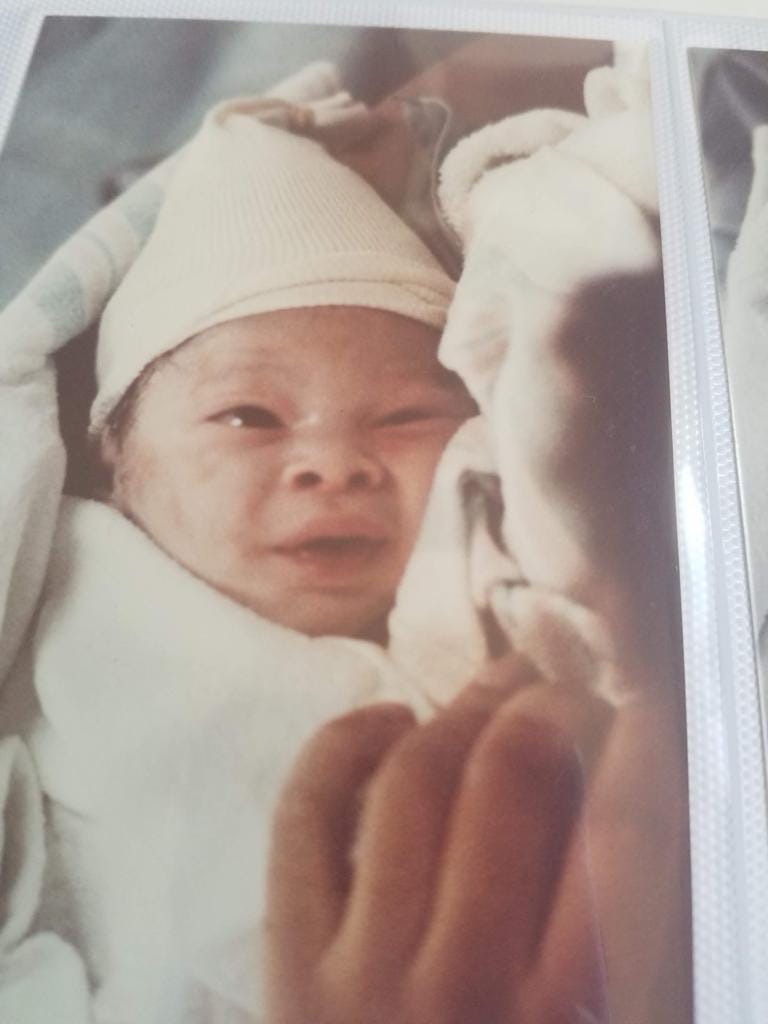Trigger Warning: This story contains themes of suicide.
When I was growing up in the 60s at Thibella/Sea Point, Maseru, postpartum care was a very significant and relevant practice that served an important function to the wellbeing of a new mother (motsoetse) and her newborn, as well as the community. Once the women in their respective communities knew a woman was to give birth, the news was met with anticipated excitement as the community happily prepared themselves for a big day of support after the birth of a baby. The quality of support for both a home or hospital birth was usually met with the same enthusiasm.
I have no clear time frame as to the beginnings of this extraordinary cultural support of postpartum care by women within the country and their respective communities. My grandmother was a midwife and she gave me an opportunity to help her put in place clean towels or sheets, and to start the Primus stove for boiled water that she needed to deliver the baby.
After doing my part, I was required to wait outside or in the kitchen area while the birthing assistance took place. By the time my grandmother emerged from the room, the community women would have gathered to immediately take over the postpartum care and support for the new mother and her infant. This postpartum care immediately after the birth was carried out with such quick precision by the community women — it made me excited to see community cooperation at its best!


Each woman designated themselves to the activity roles they chose to support the new mother and her family. The purpose of this support played an important role in the physical, emotional, and mental well-being of both the new mother and her newborn. Postpartum care then was coupled with an after-birth baby shower. Family members, friends, and work colleagues would stop by, bearing presents for both the new mother and her baby. Cards were presented to the new mother, while other visitors came in to view the newborn, expressing their joy and sharing their opinions of who they believe the infant looks like between the mom or dad, which at times was met with fond laughter by everyone.
Other visitors acknowledged the importance of their friend, admiring her bravery and her strength, honoring her motherhood. Others brought baby clothes and yet others came with words of more praise and advice, especially those who had given birth multiple times themselves, followed by chuckles of laughter.
The support and celebrations on this special occasion gave the new mother a boost of confidence and a positive outlook towards her role as a mother. All this attention of support left the new mother feeling happier and grateful to the community for showing her how important it is to bring life into the world. It is with these special moments of support after a mother has given birth and baby gift offerings that I highly encourage this practice to make a comeback.
The benefits of postpartum care became evidently apparent to me when I was mentally ill and exhausted, lacking support after giving birth to my son. Then, I saw clearly that postpartum care and support could serve as a lifeline to experiencing a happier motherhood. Lack of postpartum care support exposes new mothers to feelings of sadness, loneliness, and isolation.
We just celebrated Christmas which reminded me that the three wise men came bearing gifts to celebrate baby Jesus’s birth. This proves to me that post-birth baby showers do play an essential part in how healthy and happy a new mother could be. Modern-day baby shower parties are fun but the problems for new mothers arise when after giving birth, they find themselves mostly alone and isolated, left on their own to attend to their mothering tasks without much-needed support. Again I would like to encourage this postpartum care/ baby shower support to be brought back, as the benefits to the new mother and her baby have been demonstrated to be valuable.

The fact that a new mother is able to get enough rest, to give her body a chance to heal and fully recover and gain the strength she would need once the support dwindles down. Again, it is important to remember that she would not necessarily be left alone as she would be in the home of her mother or mother-in-law to further receive postpartum care. Remember that this support could last a month to three months or more, especially for mothers who did not work outside of their homes. Most significantly, because of this postpartum care support, there were no incidences of new mothers experiencing postpartum depression, anxiety, stress, psychosis, or suicide.
There seems to be more prevalent postpartum psychosis or suicide around the world of late, when there could be a simple solution of showing support to the new mother. The sad part though is the difficulty of not knowing for certain that mental illness was involved when mothers kill their babies. Because death has occurred, it’s usually left to the law to deliver multiple-year or life imprisonments or psychiatric hospital admissions.
Years ago, when I gave birth to my son in the US, out of my naivety, believing that childbirth is universal, I assumed that my Western mother-in-law would be there as my postpartum care support, which did not happen. It did not occur to me that Western culture would be different from my own, that their approach to postpartum care support would be different from that which I was part of growing up.
After I gave birth, I watched my mother-in-law accompany me to my home to drop my belongings from the hospital and say her goodbyes back to her home. I was in shock. Is she leaving me on my own? Tears welling down from my face, I realized I was going to be on my own as a new mother. My tears turned into a loud howl, I dropped down on my knees, and my body curled like the infant I had just given birth to. I called my mother, wishing she was with me to support and care for me. I needed others to care for me, just as my newborn needed me to care for him.
The trauma of it all was difficult to fathom. It is known that hormonal imbalance after birth can create a rollercoaster of emotions that could trigger postpartum health issues physical, emotional, and mental. In my case, I became deeply saddened and found myself thinking of the postpartum care I witnessed growing up, realizing that I was in a foreign land that did not have such a culture of postpartum care.
For me, postpartum psychosis came in instant, intense occurrences. I never knew what hit me. I could not put a name to what was happening to me. I found myself traumatized, in fear, alone in the winter months, terrorized by my own mental instability. Sure, my husband was around but he was at work all day. I suffered from a devastating mental illness of visions that prompted me to kill my baby in the most horrific violent ways. I found myself in tears, afraid to even tell my husband what I was going through. I didn't even know I needed to seek help from my healthcare professionals. Something evil had taken over my mind, the only thing left for me was to fight back. In my mind, I literally saw the devil that wanted to take away the joy of my motherhood and turn it into an evil murderous experience.
I was afraid, angry, lost, and in tears for three months. The only hope was to reach out to God in prayer — one minute, lashing out at God in anger and asking him why, while in the same breath, crying asking him for mercy, to please save me and my son. Only God’s prayers and his mercy prevented me from killing my newborn, hence the title of my book, My Postpartum Psychosis and God’s Deliverance (2020). That is how severe mental illness after childbirth can be and how it affects some mothers. The causes, known and unknown, are many and differ from woman to woman. For me, one of the triggers that plunged me into the spiral of postpartum psychosis, I felt was a lack of support. I have mentioned other factors that I believe are related to my psychosis in my book.
As I conclude, I want to say that here in the US this supportive postpartum care was practiced by rural women in the 1900s, only to be lost to modern-day doctors and hospital settings. This article is my way of advocating for postpartum care and support that I believe can save lives and prevent the mental illness that is associated with childbirth, be it hormonal imbalance or otherwise. Not all mothers are affected, and for those who are, there are more reasons than one.
I am not sure if Lesotho and South Africa have totally abandoned the practice of postpartum care that I grew up with and replaced it with women who feel they are strong or have a ‘superwoman’ mentality that they can give birth and be back at work the next day. There is still a lot to be done around the world concerning maternal health.
Here in the US there is so much disparity between white people and people of color when it comes to maternal health issues and health in general. It would be a great service to see the practice of postpartum care make a comeback with more training for women who are interested in becoming midwives as the benefits can clearly save the lives of mothers and their babies, and prevent postpartum suicide too.
Diaspora families need to consider finding support from each other during pregnancy and in the postpartum period. Anything from a couple of days, a week to a month would suffice as people are busy with their own respective jobs. Let’s take advantage of this loving, caring, compassionate support women have shown to others in the past. Fathers too need to participate, especially if there are other children to care for while the new mother is taking a much-needed rest.
The one modern-day practice I highly support too, is attending childbirth education classes at early stages of pregnancy because these can support and educate new mothers about the development of the baby from conception to birth. The mothers learn about healthy foods to eat that are nourishing to the pregnant mother and the growing fetus, and about their own changing bodies in general. Classes can give new mothers knowledge and empower them to take control of their childbirth experiences. They can also offer tips on managing morning sickness and others like elevating their feet to lessen the swelling of their feet and ankles.
Routine monthly check-ups are necessary to watch for any health changes that can occur with pregnancy. These classes can also introduce exercise routines that help strengthen, energize, and relax muscles and encourage the mothers to continue them at home. Keeping their bodies healthy through exercise could give pregnant mothers a sense of joy and the strength they need when the time comes to give birth. They definitely need strength to handle the fetus’ growing size within the pregnant body and in the months after birth. Such classes also offer discussions on expectations of what kind of a mother you would be and who the baby would look like between the mother and the father. Mothers’ feelings and changing moods from pregnancy to birth become part of discussions too. I took the classes here in the US and they were the best educational times of my pregnancy!
This article is a way for me to bring awareness of the importance of women and the role of childbirth. Sure, men supply the sperm but it’s up to a woman to nurture it from her own body to become a human being! That is the ultimate gift God has given women. I call for the diaspora families and women in general to take the initiative to support women and families of childbearing years. Maternal mortality rates can be reduced or eliminated by women supporting other women during their childbearing years. Postpartum mental health issues are real. Support is one way the tragedies that occur at the postpartum stage can be avoided.
Thank you.
Additional resources:
The January 12-18, 2024 edition of Newsday has an excellent feature titled “Battling double depression long after childbirth.” In it, Ntsoaki Motaung tells the story of a young mother who struggled with severe postpartum depression, and most shockingly, how children born to young mothers face a higher risk of mental health challenges.
Read other articles by Catherine Mohanuoa Ingram:





